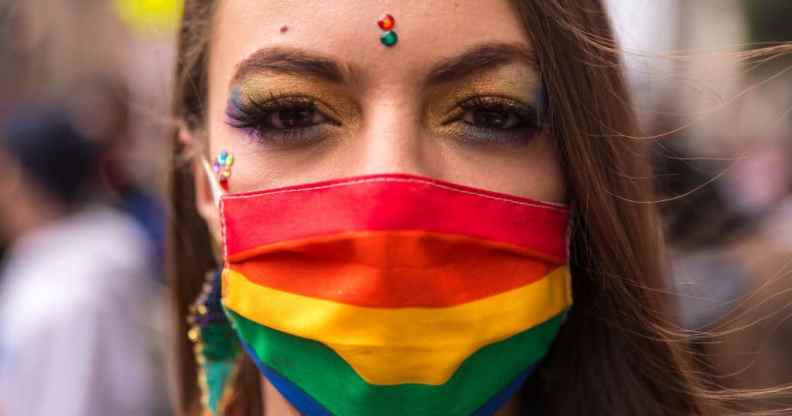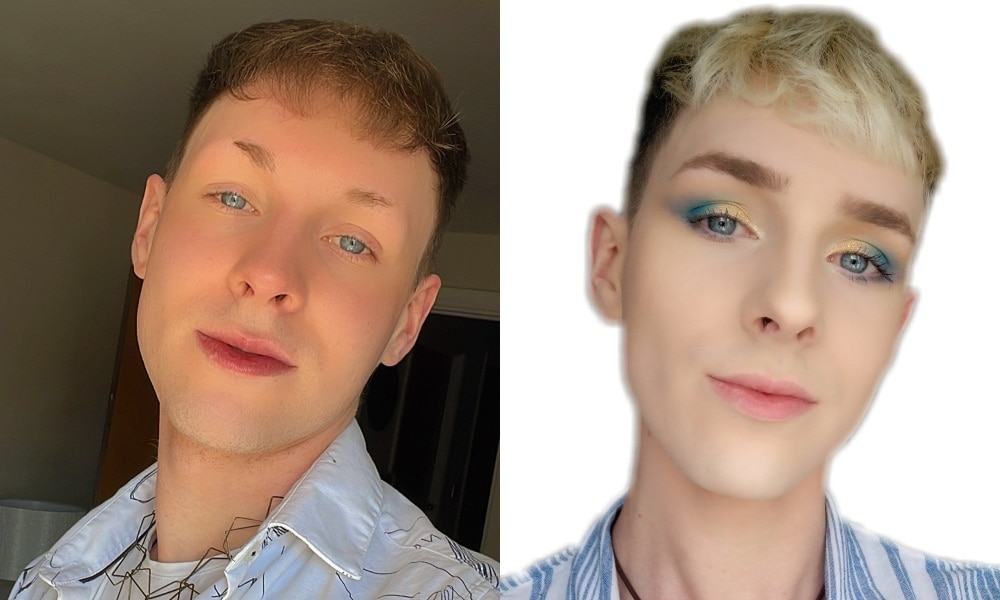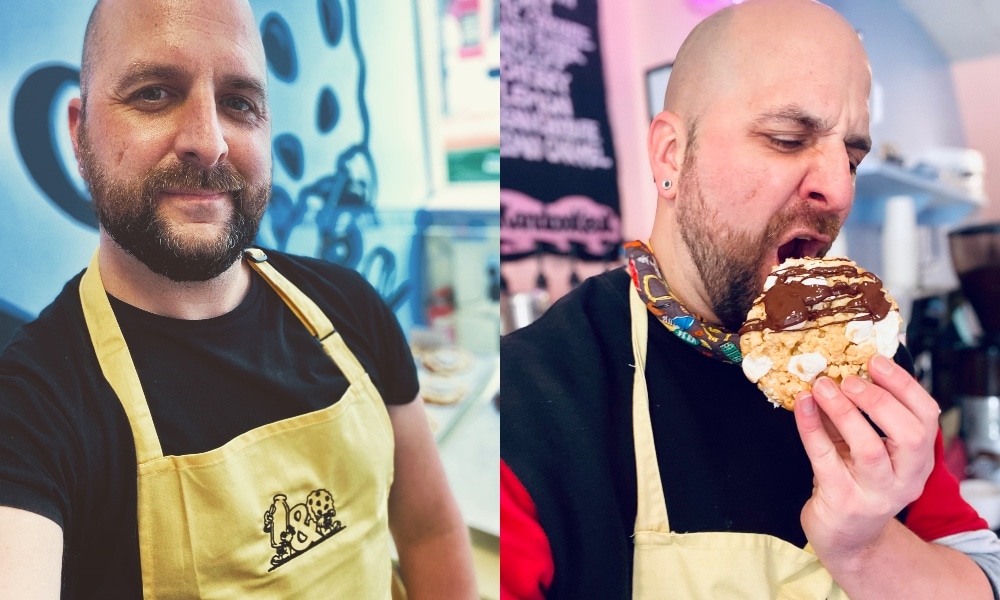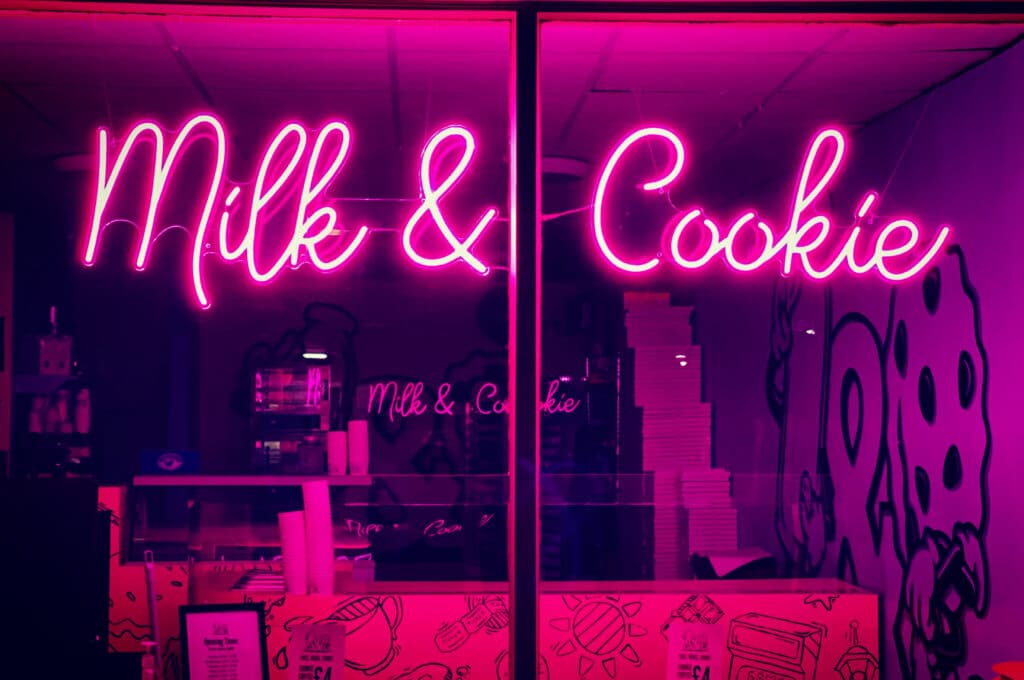I didn’t want to die without the world knowing who I really am: LGBT+ folk on two years of COVID

A person wearing a rainbow face covering. (Antonio Cascio/SOPA Images/LightRocket via Getty)
A lot can happen in two years – an understatement for those whose lives were forever changed by lockdown.
Stood alone in a field, Kiran had been on the phone to a domestic abuse hotline for more than two hours before realising they were completely sunburned.
“Listen, if you don’t feel safe there, you may need to call the police,” a support worker told the non-binary 26-year-old. “There” was their family home in Kidderminster, a town south-west of Birmingham.
It was 2020. Britain’s first COVID-19 lockdown, first announced by prime minister Boris Johnson on 23 March, had frozen the nation as the little-understood virus seized the world.
Throughout lockdown, Kiran’s family routinely misgendered and humiliated them. They even made a family WhatsApp group chat that they weren’t included in to scrutinise them. So they left, sofa-surfing around Birmingham for months before discovering drag.
Two years on, they finally feel like they have “a sense of purpose”. And they’re not alone. In conversations with PinkNews, queer folk, some immunocompromised, reflected on life under lockdown two years on since it was first announced. Their stories were ones of isolation, strength and transformation.
Kiran

Through lockdown, Kiran came to find their calling in life. (Supplied)
Like many, Kiran thought COVID-19 sounded like nothing more than a garden-variety cold. Then the prime minister shuttered non-essential shops and demanded people stay in their homes, except for trips for food or medicine. Still, Kiran thought, this lockdown wouldn’t last for more than two weeks.
It lasted months. “I was drinking relentlessly throughout the first lockdown as a coping mechanism,” they said, wary of being “trapped” with their family.
Kiran had moved back home the year before after their employer fired them “because of [their] identity”. They had no other choice but to stay with relatives, who come from a military background.
“You were expected to take orders,” Kiran said. “I was truly being ostracised by my family for just being me. I was in a very dark place.”
The day before they became homeless, Kiran’s father “smashed” down their bedroom door. It prompted them to phone a domestic abuse hotline the day after. “I came back to my mum screaming at me – she called me a disgrace to all LGBT+ people and said I fake being trans, that I am not gay.”
Their mother rang the police, claiming that Kiran had been “threatening” the family. “If it meant going to a jail cell, then let’s go,” Kiran replied. “I’d rather go there than spend another minute in this environment.”
Left at the station with nothing but a rucksack by the police, they caught a train to Birmingham. “We never want to see you again,” their family texted.
For months, Kiran lived between their “drag family”, friends and various housing associations. They quickly discovered that, for queer people experiencing homelessness outside of London, there are next to no support services for them.
After being a sex worker for six months, their friends suggested they try out drag. “At this point, things were starting to reopen, and I was soon doing £30 gigs every month,” they said. “It was an added bonus. I could treat myself to a takeaway or deodorant. Drag literally saved me.”
Two years after the first lockdown, all legal restrictions have been rescinded – and on April 1, free universal testing will end. Kiran “hates the thought” of being back in the situation they once were in, struggling for cash, while also being forced to pay for testing to survive.
And while legally it appears that the pandemic is over, in the last seven days more than 830 people have died of COVID-19.
“We need to get out of the idea that coronavirus doesn’t exist anymore,” Kiran added. “People are still dying.”
Jessica

Jessica, who has several health conditions, remains fearful yet hopeful about the future. (Supplied)
Jessica, a 21-year-old student journalist living in London, had a very good reason to come out as bisexual during Britain’s first lockdown – she didn’t want to die with the world not knowing who she was.
“When I saw a lot of people dying, people weren’t able to be themselves,” she said. “So many hadn’t lived their lives. So many hid being LGBT+ to their families, and now no one would ever know.
“I didn’t want to hide something for the rest of my life. Anything can happen tomorrow.”
Jessica had good reason to fear the virus. “I had tracheal reconstruction when I was a baby,” she explained, “which means I’ve got respiratory issues. I’ve got costochondritis, which is an inflammation of the tissue between the ribs.” She also has “a heart murmur, asthma, arthritis, hypermobility”.
“I just fall ill all the time,” she added. “When the lockdown was first announced, I was scared as me, my mum and my little brother are all at high risk. I was halfway through my first year [at university] and it was terrifying. It was everywhere.”
Jessica also has depression and anxiety. Outdoor walks were a source of nourishment to her – and a way for her to ease her arthritis – yet the first lockdown forced her to stay inside. She said this threw her mental health into jeopardy: “I literally did nothing all the time.”
The last restrictions being lifted has been a source of stress to many vulnerable people who are more susceptible to illness. Disabilities advocates have suggested making a new class of long-lasting preventative antibody treatments such as Evusheld more widely available.
Such medicines would put minds at ease. For now, though she is fearful, Jessica is excited to return to the outside world.
“I haven’t seen people in months, years even, because of lockdown,” Jessica said. She’s especially excited to see her best friend of 18 years.
“I am also terrified,” she continued, “how do you even speak to people anymore?”
Stuart Saint

Stuart Saint felt abandoned by the world during the pandemic – but he channelled his frustration into his business. (Stuart Saint)
For two years, Stuart Saint’s world has been very small.
A 44-year-old gay man living with HIV in Margate, he is one of more than half a million people in Britain who are immunocompromised. Saint has an antibody deficiency, meaning that his body cannot produce antibodies to battle infections – he has an antibody infusion every four weeks.
He was in the arts industry, but overnight his work dried up. As Saint had only been self-employed for a few months, he didn’t qualify for grants or furlough. Living on Universal Credit, Saint relied on food vouchers to get by while his debt piled up.
Forced to shelter at home, Saint lived a life of loneliness – something intensified as Britain began to seemingly move on from the pandemic without him.
“I stayed indoors for five months, which was very difficult,” he said. “It was really scary considering my condition.”
As an embattled NHS was squeezed by COVID-19, Saint saw his health threatened. “My infusions were stopped for five months due to all services being diverted to COVID,” he said.
“That was scary as I suffered chronic fatigue and weakness from not having the infusion and mentally was challenging.”
As well as this, living in isolation meant he brought to his knees by boredom. But he channeled his energies into his passion – baking – and last year opened his own dessert bar Milk & Cookie. Its pink neon sign is already a fixture of the high street and Instagram grids.

(Stuart Saint)
As year three of the pandemic lurches forward, life is better for Saint. “I feel lucky to have all my jabs and amazing doctors that support me,” he said.
But with mask mandates ditched and even self-isolation rules scrapped, Saint says he feels “petrified” of the future.
“It feels like, all the thought for others, especially those who are vulnerable, has gone out the window,” he said. “I’ve even heard a lot of people saying things like, the vulnerable should stay indoors, it’s our fault we are this way. It’s heartbreaking.”

